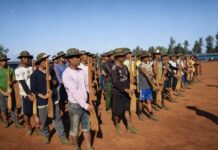In light of the continuing crisis in northern Rakhine State, the UN Human Rights Council (HRC) held a special session on 5 December, 2017, issuing a resolution condemning “alleged systematic and gross violations of human rights and abuses committed against persons belonging to the Rohingya Muslim community and other minorities in Myanmar[1] .”
The resolution outlines the violations committed in a “systematic, targeted and deliberate manner by security forces,” including “disproportionate use of force, extrajudicial and summary killings, including of children, sexual violence, including rape, indiscriminate firing of weapons and the planting of landmines, the destruction of property, livelihoods and futures, disappearances, torture and other cruel, inhuman or degrading treatment or punishment, attacks on places of worship and religious intolerance, resulting in large-scale forced displacement and indicating the very likely commission of crimes against humanity.”
A “systematic, targeted and deliberate manner by security forces,” including “disproportionate use of force, extrajudicial and summary killings, including of children, sexual violence, including rape, indiscriminate firing of weapons and the planting of landmines, the destruction of property, livelihoods and futures, disappearances, torture and other cruel, inhuman or degrading treatment or punishment, attacks on places of worship and religious intolerance, resulting in large-scale forced displacement and indicating the very likely commission of crimes against humanity.”
The special session comes as Bangladesh and Myanmar signed a bilateral agreement for the repatriation of over 640,000 Rohingya refugees back to Myanmar. Given the extremity of the violence that has been inflicted in northern Rakhine State by the Myanmar Army, and given that Rohingya refugees are still arriving in Bangladesh, there is a huge concern that any return would put the lives of returnees in further danger. The condition outlined in the agreement that returnees must prove their residency is a deliberately flawed point inserted by the Myanmar authorities to ensure that the process is almost impossible since many in the Rohingya community have been deprived of any such proof of residency for generations while those who had such documentation have had it taken away from them, or lost it amid the violence and burning of their villages. This only adds support to the conviction of the UN Secretary-General and the UN High Commissioner for Human Right that this is “ethnic cleansing.”
Aid agencies have also raised the issue that for those who do return, separated, isolated camps that are ostensibly temporary will become permanent and stated that they would boycott such conditions. They also released a statement outlining the conditions that must be met for a safe and dignified return – conditions that are far from being met. The reality is that the Myanmar authorities and the majority of the public in Myanmar do not want these people in their country and the few that might be able to prove their previous residence and return will likely face a situation where they are living in closed off camps for many years.
While the HRC resolution calls for Myanmar to “take all measures necessary to provide justice to victims, ensure the full accountability of perpetrators and end impunity for all violations and abuses of human rights,” accountability for such violations will not be found within domestic mechanisms. The Myanmar Army’s own internal investigation – in an Orwellian move – completely exonerated itself last month from any wrongdoing. A report produced by Progressive Voice, Action Committee for Democracy Development, and Smile Education and Development Foundation analyzing the performance of the Myanmar National Human Rights Commission (MNHRC) outlined the glaring failure of the commission to address the violations committed by the Myanmar Army. The MNHRC won’t even use the term Rohingya and instead used ‘Bengali’ in its report after an investigation in northern Rakhine State in September 2017 and even worse, it recommended further security outposts and personnel to be established in the areas. Put simply there is no political will within the Government for taking such measures for accountability and the impunity of the Myanmar Army remains entrenched – despite the atrocities it continues to commit.
Hence it is vital, in the absence of any adequate avenues for accountability within Myanmar, that the international community takes action. The Myanmar Army must be sanctioned, including by a UN Security Council imposed global arms embargo, bilateral targeted sanctions, ending all military cooperation and engagement, and imposing visa bans as well as financial sanctions against individuals that are perpetrators of the atrocities. Furthermore, all available international accountability mechanisms must be utilized to demonstrate that while perpetrators may enjoy impunity domestically, crimes against humanity will not be tolerated internationally.
The Myanmar Army must be sanctioned, including by a UN Security Council imposed global arms embargo, bilateral targeted sanctions, ending all military cooperation and engagement, and imposing visa bans as well as financial sanctions against individuals that are perpetrators of the atrocities.












Leave a Comments